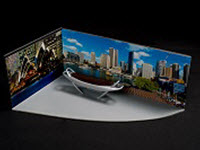Industrial Design (Honours) - 3386
Program Summary
Faculty: Built Environment
Contact: Built Environment
Campus: Sydney
Career: Undergraduate
Typical UOC Per Semester: 24
Min UOC Per Semester: 6
Max UOC Per Semester: 24
Min UOC For Award: 192
UAC Code: 423300
Domestic Entry Requirements: See Domestic Entry Requirements
International Entry Requirements: See International Entry Requirements
Award(s):
Bachelor of Industrial Design (Honours)
View program information for previous years
Program Description
As an industrial design student you will learn design process, visual communication, technology and materials, market research, ergonomics, research methods and professional practice. Projects you undertake in our design studios will give you hands-on experience and an opportunity to apply your learning in a practical environment.
Students considering industrial design as a career choice will have the capacity to develop skill in visual communication such as sketching and computer modelling. They will be curious and inventive, able to work with technology and materials, and ready to enlarge their understanding of the social, environmental and commercial contexts in which they work.
Careers in industrial design are competitive so it is critical that graduates have a high level of professional and technical excellence. The Bachelor of Industrial Design at UNSW is a four year degree that ensures you will be work-ready and highly employable as a graduate. In the final year of the degree, you will consolidate and showcase your capability with a substantial research and design project. Students graduating with honours can further their interest in research by undertaking higher degrees at UNSW.
Program Objectives and Graduate Attributes
- Industrial Design Studio
- Design presentation (Computer aided and manual communication methods)
- Technology (Materials and design for manufacture)
- Marketing
- Ergonomics
- Design Management
- Design History and Theory
Program Structure
Semester 1
Semester 2
Semester 1
- IDES2101 Design Studio 3: Production (12 UOC)
- IDES2201 Ergonomics (6 UOC)
- MARK1012 Marketing Fundamentals (6 UOC)
- IDES2021 Thinking Products (6 UOC)
- IDES2102 Design Studio 4: People (12 UOC)
- FBE Elective (6 UOC)
Semester 1
- IDES3101 Design Studio 5: Complexity (12 UOC)
- MARK2051 Consumer Behaviour (6 UOC)
- BE Interdisciplinary Course* (6 UOC)
- BE Interdisciplinary Course* (6 UOC)
- FBE Elective (6 UOC)
Semester 1
- IDES4101 Design Studio 7: Enquiry (12 UOC)
- Open Elective (6 UOC)
- General Education (6UOC)
- Open Elective (6 UOC)
- General Education (6 UOC)
NOTE: The 12UOC of BE Interdisciplinary Learning Courses can be undertaken at any stage from the end of Year 2 to the end of Year 4 including summer terms.
A list of 2016 Interdisciplinary Learning Courses is below:
Summer Semester:
- BEIL0017 Business Start Up (6 UOC)
- BEIL6000 Issues in Urbanism (6 UOC)
- BEIL6003 Cinematic Space (6 UOC)
- BEIL6007 International Study Tour (6 UOC)
- BEIL6008 International Design Studio (6 UOC)
- BEIL0001 Graphic Design for Built Env (6 UOC)
- BEIL0005 People, Place and Design (6 UOC)
- BEIL0007 Sustainable Design Thinking (6 UOC)
- BEIL0010 Creating Value for Built Env (6 UOC)
- BEIL0011 Healthy Planning (6 UOC)
- BEIL0013 Architectural Photography (6 UOC)
- BEIL0014 Digital Making (6 UOC)
- BEIL0016 Renewing the Urban Environment (6 UOC)
- BEIL6002 Urban and Regional Design (6 UOC)
- BEIL6005 Art, Architecture and Design (6 UOC)
- BEIL0001 Graphic Design for Built Env (6 UOC)
- BEIL0003 BE Annual Design Competition (6 UOC)
- BEIL0005 People, Place and Design (6 UOC)
- BEIL0006 BE OutThere Elective (6 UOC)
- BEIL0008 Vision to Reality (6 UOC)
- BEIL0009 Exhibition Design (6 UOC)
- BEIL0013 Architectural Photography (6 UOC)
- BEIL0015 Digital Design Foundations (6 UOC)
- BEIL6001 International Planning (6 UOC)
- BEIL6004 Masterpieces of Architecture (6 UOC)
- BEIL6006 Heritage Planning (6 UOC)
General Education Requirements
Honours
The Honours Score requirements calculated this way are as follows: Honours 1, a combined average of 75 and over, Honours 2 Division 1, a combined average of 72 - 74.99, Honours 2 Division 2, a combined average of 68 - 71.99.
Academic Rules
2. To fulfil these requirements, students must complete:
Depth Component
- 144 UOC of specified core courses, being all those prescribed in the faculty regulations for this program
- 12 UOC of FBE Electives from the list of BE Interdisciplinary Learning Courses
- 12 UOC of other FBE electives
- 12 units of open (free) electives, selected in accordance with the faculty regulations for undergraduate study in the Faculty of the Built Environment
- 12 units of General Education in accordance with University requirements
Open (free) Electives
Open electives can be chosen from any courses offered by any Faculty at UNSW for which the student meets pre-requisite or other enrolment requirements. The exceptions are those specific General Education GEN prefix courses which cannot be counted as open electives. Open electives do not need to be taken outside the Faculty, students can choose FBE electives as open electives.
FBE Electives
FBE Electives are elective courses offered by the Faculty and are generally denoted by a BENV prefix. Electives from outside the Faculty cannot be counted as FBE electives.
Fees
Career Information
Graduates have also taken their design skills into firms working in related fields, such as packaging, graphic design, interior architecture, architecture and marketing. The BIndDes is unique because of its comprehensive combination of design skills, marketing and technology. This means graduates will enjoy diverse career opportunities, with many taking leading positions in the design field.
Graduates may apply for membership of the Design Institute of Australia.
Some Careers:
- Product designer within a design consultancy
- Product designer within a multi-disciplinary design team (architectural and engineering consultancies)
- Product designer within the manufacturing sector (consumer and public access products, electrical, transport, scientific, medical, retail, furniture, telecommunications)
- Digital multimedia designer
- Product branding and marketing
- Packaging designer
- Exhibition designer
- Graphic designer
Professional Recognition
Area(s) of Specialisation









